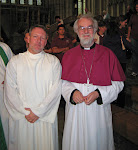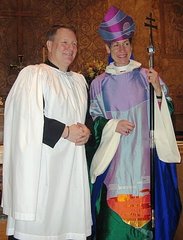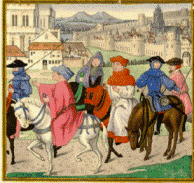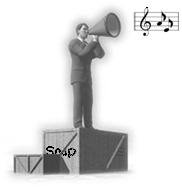Preached on the second Sunday of Advent, December 9, 2007 at St. James Episcopal Church Fordham Manor. Scripture readings this sermon is based on can be found here.
+ May the words of my mouth and the meditations of all our hearts be acceptable in your sight, O Lord, our Rock and our Redeemer.
 This weekend Oprah Winfrey and Bill Clinton are out on the road, campaigning for their favorite Presidential candidates. Oprah Winfrey is heading to Iowa, New Hampshire and South Carolina on a campaign swing for Illinois Senator Barak Obama. Bill Clinton is in many of the same places campaigning for his wife and our Senator, Hillary Clinton. Each of these public figures will be making predictions and campaign promises on behalf of the candidates that they think should be our next president. We’re being told that change is needed, that experience is called for, that an end to the war in Iraq is on the horizon.
This weekend Oprah Winfrey and Bill Clinton are out on the road, campaigning for their favorite Presidential candidates. Oprah Winfrey is heading to Iowa, New Hampshire and South Carolina on a campaign swing for Illinois Senator Barak Obama. Bill Clinton is in many of the same places campaigning for his wife and our Senator, Hillary Clinton. Each of these public figures will be making predictions and campaign promises on behalf of the candidates that they think should be our next president. We’re being told that change is needed, that experience is called for, that an end to the war in Iraq is on the horizon.  Prophesies of justice and promises of righteousness are all over CNN this weekend. These promises like others we have heard from public figures may or may not be kept. I think most of us have come to view the promises of politicians with some skepticism. It is rare when the Utopia promised us during campaign season is indeed the land we come to live in after the votes are counted in November, and our choice of leader is anointed on inauguration day.
Prophesies of justice and promises of righteousness are all over CNN this weekend. These promises like others we have heard from public figures may or may not be kept. I think most of us have come to view the promises of politicians with some skepticism. It is rare when the Utopia promised us during campaign season is indeed the land we come to live in after the votes are counted in November, and our choice of leader is anointed on inauguration day.
Advent is kind of like a campaign season. We hear from the prophet Isaiah all through Advent, with predictions of the one who is to come and descriptions of the bounty and equity of the coming kingdom. Today as well, in our gospel reading, we hear from John the Baptist who tells us that the one who is coming is bringing wrath and judgment. Oprah Winfrey and Bill Clinton, Isaiah and John the Baptist are all doing the same thing -- making promises and predictions of what is to come. I think that like good Christians and good citizens, we need to examine these predictions with care. Isaiah tells us that a new leader is going to rise up. He will be a shoot from the tree of Jesse, the same family tree that brought Israel Kings David, Solomon, and Hezekiah. This new king will be wise and understanding. He will be a mighty judge. He will slay the wicked and protect the meek. He will be faithful and he will be righteous. The one to come, according to Isaiah, will bring peace the likes of which we can only imagine, wolves shall lie down with lambs. The ferocious man-eating lion shall become a vegetarian. There will be an era of peace and righteousness that will encompass every aspect of creation. This new royal heir will bring about a period of peace and prosperity which Israel has not seen in many, many years -- and it is not only Israel that will know his benevolence. All nations shall be drawn into peaceful concord -- and enemies of every stripe, predators and prey, will live in harmony. With a platform like that, he’s got my vote!
Isaiah tells us that a new leader is going to rise up. He will be a shoot from the tree of Jesse, the same family tree that brought Israel Kings David, Solomon, and Hezekiah. This new king will be wise and understanding. He will be a mighty judge. He will slay the wicked and protect the meek. He will be faithful and he will be righteous. The one to come, according to Isaiah, will bring peace the likes of which we can only imagine, wolves shall lie down with lambs. The ferocious man-eating lion shall become a vegetarian. There will be an era of peace and righteousness that will encompass every aspect of creation. This new royal heir will bring about a period of peace and prosperity which Israel has not seen in many, many years -- and it is not only Israel that will know his benevolence. All nations shall be drawn into peaceful concord -- and enemies of every stripe, predators and prey, will live in harmony. With a platform like that, he’s got my vote! You’ve heard the expression, “Clothes make the man.” Well, we’re meant to know that John the Baptist is a true prophet, that he means business, by the description of his outfit in today’s gospel. The Bible doesn’t often give us an account of the latest fashion trends in the ancient Middle East, so when it does, you know it means something. In today’s gospel, Matthew tells us that John is wearing camel’s hair and a leather belt. This is the same sort of ‘prophet’s uniform’ worn by Elijah, the prophet that was most associated with the coming of the Messiah. Scripture had predicted that Elijah would return as the forerunner of the Messiah. If John the Baptist is in fact the returning Elijah, then what he says if of great importance and who he points to is even more important
You’ve heard the expression, “Clothes make the man.” Well, we’re meant to know that John the Baptist is a true prophet, that he means business, by the description of his outfit in today’s gospel. The Bible doesn’t often give us an account of the latest fashion trends in the ancient Middle East, so when it does, you know it means something. In today’s gospel, Matthew tells us that John is wearing camel’s hair and a leather belt. This is the same sort of ‘prophet’s uniform’ worn by Elijah, the prophet that was most associated with the coming of the Messiah. Scripture had predicted that Elijah would return as the forerunner of the Messiah. If John the Baptist is in fact the returning Elijah, then what he says if of great importance and who he points to is even more important
John’s candidate for the coming one, the Messiah, seems altogether different from Isaiah’s candidate. This coming Messiah will be an awesome and terrible judge, come to separate the wheat from the chaff -- and the chaff he will burn in an unquenchable fire. Every tree that does not bear good fruit is bound for the same fire. According to John there is a Messiah coming who is to coming to baptize not with water as John himself does, but with the fire of the Holy Spirit.
If Isaiah’s candidate is running on the peace and prosperity platform, then I think John’s candidate is running on a law-and-order platform. Isaiah is promising that his candidate will put a chicken in every pot. John is promising that his candidate is going to run the rascals out of Albany or Washington or Jerusalem -- or all three.
Both of these prophetic visions of the reign of the hoped for Messiah are pretty incredible, in their own ways. It is inconceivable that the lions of the savannah are suddenly going to give up killing and eating other animals. One cannot imagine that such a overturning of nature can happen. And indeed it cannot happen in this world. It is a vision of the world to come, of the eschatological reality that will come to be at the end of time, when God’s plan for the salvation of all creation is fulfilled. Likewise, John promises a winnowing of the just and unjust, and a punishment of the wicked that too seems to go against what we know of the world we live in. We know that the wicked often get away with it, don’t we? The Pharisees and Sadducees of our day often repent of wrong-doing, but they don’t always appear to come to Jesus or be brought to justice.
Both of these visions presented by Isaiah and John the Baptist might seem to us to be, as yet, unfulfilled. There is a lot that’s been promised, that has been predicted, that has yet to come about. But Paul, I think, feels a bit more optimistic about it all. Paul tells us in today’s reading from his letter to the Romans that at least some of the campaign promises that have been made on behalf of God are being kept, and have come to fruition in his own day. He quotes from the chapter of Isaiah that we read this morning, telling the community of believers at Rome that the root of the tree of Jesse has brought salvation to the nations, to the Gentiles.
But Paul, I think, feels a bit more optimistic about it all. Paul tells us in today’s reading from his letter to the Romans that at least some of the campaign promises that have been made on behalf of God are being kept, and have come to fruition in his own day. He quotes from the chapter of Isaiah that we read this morning, telling the community of believers at Rome that the root of the tree of Jesse has brought salvation to the nations, to the Gentiles.
Through Paul’s mission to the Gentiles, the salvation once promised to the Jews has been extended to all humanity. The Gentiles may now indeed rejoice as Deuteronomy says, because God in Jesus Christ has made all people heirs of the promises made to Abraham and his descendents. John the Baptist tells the Pharisees and Sadducees that God could raise up children to Abraham from the stones of the ground. Paul says that in Jesus, God has raised up heirs to the promises made to Abraham from every nation of the earth. In the incarnation, death and resurrection of Jesus Christ, God has confirmed the promises given to the patriarchs, so that as Paul says, the Gentiles too might glorify the one God.
For Paul, the promised one of Isaiah and of John the Baptist is Jesus Christ. Jesus is the one to bring judgment and mercy, to separate the good and bad fruits, and to bring together all nations. And he tells us that these prophecies recorded in Scripture have become a source of strength for believers. “By the encouragement of the Scriptures we may have hope,” he tells the Romans. Because the God who has kept his promise in extending salvation to the Gentiles -- we can be sure -- will keep all the promises he has made to our ancestors in faith, and to us.
It is clear from many of Paul’s writings that he and his contemporaries believed the return of the Jesus would be very soon. The end was near. The fulfillment of all things was soon to occur. As far as we can tell, Paul would have been surprised to find us here nearly 2,000 years later still waiting for the second coming of the Lord, and for the full manifestation of the kingdom of God.
Paul’s generation saw the first Advent of the incarnation of Jesus. The apostles walked with and talked with Jesus while he was on earth. They met him in the upper room after he had risen again. They came to believe that truly this was the Son of God. They saw him ascend to heaven with a promise to return and, in time, to bring all things in heaven and earth to their culmination in his kingdom.
And we are waiting still. In our own generation we, like Paul, are awaiting a second Advent, the second coming of the Lord. We too expect that some day all of the prophecies will be fulfilled and that the earth will be, as Isaiah says, “full of the knowledge of the Lord.”
We can sit and wait for this to happen, I suppose. We can make predictions of our own and head to Jerusalem on New Year’s Eve and wait for something to appear in the skies as some folks have done. Or we can watch the weather report, and predict that floods here or hurricanes there are surely the signs that it’s all about to come to an end. We can do that if we like, but it seems a waste of a life. It seems an awfully flat footed response to the gospel of peace and justice that has been declared to us. The message of Scripture can often seem to be about a time yet to come, but it’s also about a time that has already come, and it’s also about the time now. There’s not much you and I can do about the future, and less we can do about the past. But there is something we can do now. We have been given a span of days on this earth, and thanks to God’s gift of free will, those days are ours to live as we choose.
I think that while we wait for Christ to come again, we can help God out a little bit. We can help make our own world, in our own day, at least a small reflection of the reign of God that we expect in the fulfillment of God’s kingdom at the end of time. We can try to make manifest some of the miraculous peace and justice that the prophecies talk about.
We are, after all, the Body of Christ in the world, we are, in a few moments, to be feed with his holy and sacred food. We are nourished by our Lord and savior with his body and blood to be his body, his agents in our own day. As the incarnation was born in Jesus, so his kingdom can become incarnate in us, when we do God’s will. There is much to do and much to hope for. We cannot do it all. But we can make a beginning; we can do homage to our incarnate Lord, by seeking to live by the values of God’s kingdom come in the here and now.
There is great enmity in our church, and in our world. There is strife among Jews and Gentile and Muslims and Christians, among Conservatives and Progressives in our Anglican Communion. Wars and rumors of war continue; there is injustice almost every where we turn. Our mission as Christians is to be Christ in this world, and to be what Isaiah calls the spirit of wisdom and understanding, the spirit of counsel and might, the spirit of knowledge and fear of the Lord, in our own day. We will not bring about the awesome visions of Isaiah or of John the Baptist, but we can do what we can do. And we can, as does Paul, abound in hope by the power of the Holy Spirit. Preachers should practice what they preach. I should follow what Mr. Brown calls ‘my rhetoric’. Mr. Longsworth, there’s a turkey in your future. It will be my contribution to the St. James Christmas eve dinner. I can’t make the wolf and the lamb to lie down together, but I can provide a little turkey for those who will sit down together on Christmas Eve in this church to celebrate the nativity of our Lord.
Preachers should practice what they preach. I should follow what Mr. Brown calls ‘my rhetoric’. Mr. Longsworth, there’s a turkey in your future. It will be my contribution to the St. James Christmas eve dinner. I can’t make the wolf and the lamb to lie down together, but I can provide a little turkey for those who will sit down together on Christmas Eve in this church to celebrate the nativity of our Lord.
During this Advent season, I invite you to look for the ways, either great or small, in which you can help to bring the peace and the justice that we hope for at the end of time into the world that we live in today.
Our king is coming, and yet there is so much of his kingdom yet to come. Prepare your hearts for great joyfulness. Prepare your souls for the judgment of God. And make ready to serve your Lord and Savior Jesus Christ, by serving the needs of one another. As we prayed our in Collect this morning, make ready to greet with joy the coming of Jesus Christ our Redeemer.
Amen







No comments:
Post a Comment